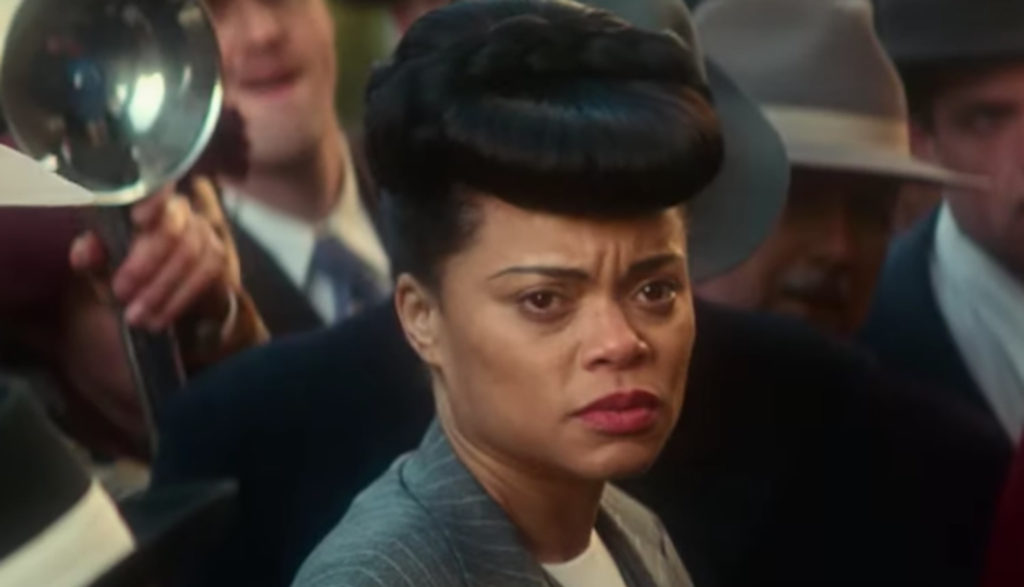
In 1937, a bill to ban the lynching of Blacks was presented to the Senate. It did not pass. Ten years later, Billie Holiday wanted to sing about it. She had something to say.
But her famous, harrowing tune “Strange Fruit” was regarded by many as controversial and dangerous because it graphically described a lynching. And yet, the problem wasn’t the song’s lyrics. The problem was that many people in the government were afraid of an uprising. They were afraid that they would be held accountable for their racist views. So, they fought to stop her. But they couldn’t take Billie Holliday down just for singing a song. Instead, they’d have to use her addiction to heroine to tell a false narrative. And though they tried to silence her, Billie Holiday lived her traumatic life as a woman who earnestly wanted to see justice … even as she fought to survive her own demons.
But her famous, harrowing tune “Strange Fruit” was regarded by many as controversial and dangerous because it graphically described a lynching. And yet, the problem wasn’t the song’s lyrics. The problem was that many people in the government were afraid of an uprising. They were afraid that they would be held accountable for their racism.
So, they fought to stop her. But they couldn’t take Billie Holliday down just for singing a song. Instead, they’d have to use her addiction to heroine to tell a false narrative. And though they tried to silence her, Billie Holiday lived her traumatic life as a woman who earnestly wanted to see justice … even as she fought to survive her own demons.
After witnessing a lynching, Billie chooses to ignore drugs and, instead, to sing “Strange Fruit” onstage as an act of solidarity and protest. She knows that the government wants to “shut her up.” And although she is belittled, threatened and degraded she still chooses to sing about the things most want to turn a blind eye toward. Many men and women view Billie Holiday as a heroine, seeing her as a brave voice willing to speak out against racism and injustice. And although Billie is a deeply troubled woman in many ways, she is portrayed as a brave, fierce woman willing to stand for justice.
A man named Jimmy Fletcher starts out as Billie’s enemy. But he eventually realizes that the government is using him, as a Black man, to silence Billie because of her singing, not because of her drug use. Jimmy is the first man in the movie to show Billie genuine compassion and tender love.
Many of Billie’s friends try to encourage her to stay away from heroin.
Billie prays at a church, she also sings about praying, and a funeral for her dog is held at a church. Billie comments that she should have been a “gospel singer.” Billie and her friends jokingly say “in Jesus’ name” a few times.
A few people comment that “jazz music is the devils work.” We hear Billie sing, “The devil and I began to dance a slow dance.”
Throughout the film, Billie is involved with both men and women, although we only hear about her sexual involvement with women. But when it comes to men, she is openly involved with many. Although married, Billie has sex with other men, most of whom are physically and emotionally abusive, like her husband. When she eventually has sex with Jimmy, she’s uncertain of what to do when he doesn’t abuse, harm or take advantage of her.
Two graphic sex scenes involve bare breasts, backsides and include explicit movements.
We hear a reference to a man cross dressing and being aroused by other men. Affairs are extremely common, accepted and often discussed. A man says that he will have sex with a prostitute so he can avoid giving his wife another venereal disease. A group of imprisoned women is sprayed with water while in the shower, where we see them topless as well.
Billie was “raised” by her single mother, who was a prostitute. In a flashback, we see Billie searching for her mother in a “whorehouse.” As she does, she opens the door to find men in their boxers and women completely topless. Eventually, Billie’s mother finds her lying in bed and tells her that she needs to get up and go make money herself as a prostitute. Billie begs to stay with her mother but is ignored and told to take care of herself …
And although we never see Billie acting on her mother’s demand, we do hear later that she was raped when she was 10 years old. This horrific act sets into motion Billie’s trauma-related responses to relationships, sex and sexual intimacy (all of which we see and hear in her lyrics); she is more comfortable in an abusive, controlling relationship than in a loving one.
We see these abusive relationships up close and personal as Billie gets hit by many men and occasionally hits them back in retaliation. In one scene, she’s grabbed by the hair, punched and kicked in the stomach.
Billie sings her song “Strange Fruit” many times throughout the film. Once, when she and her tour bus stop on the side of the road, she accidentally stumbles upon a lynching; what she witnesses is absolutely evil and horrific. A deceased woman hangs from a tree while her husband, weeping, clutches her legs. Her two young girls wail for their mommy to come down “from the tree” as a cross burns in their yard. Similar drawings are shown throughout the film, and the subject is heavily discussed.
Billie and her friends hold a funeral for her dog. Billie coughs up blood from cirrhosis and later, at the age of 44, dies from the disease. Two men fight over Billie, punching one another.
A black man refuses to let Billie Holiday on an elevator with her white friend, telling Billie, “They’re killing us for less down South.”
Jesus’ name is misused twice, while God’s name is misused more than 10 times, often paired with “d–n” and “d–mit.” The f-word is heard nearly 40 times while the s-word is heard more than 20 times.
Other profanities include many utterances each of “b–ch,” “a–,” “d–n,” “d–mit,” “b–ch” and “h—.” The n-word is used more than 20 times. A Black man refers to two white people as “snow bunnies” once.
There is a lot of drug use in the movie, primarily the use of heroin.
Billie, along with friends and family, use needles to inject heroin into their bloodstream throughout multiple scenes. And these scenes are anything but tame. We see the process of heroin being made and purchased, along with men and women injecting themselves, licking the dripping blood off of their arms and then laying around while high.
Billie gets framed for drug use as a lover slips opium into her coat pocket. Billie and her friends spend nearly all their money on drugs while touring; Billie loses her temper a few times after being denied drugs.
Billie and many others consume hard liquor, champagne and other alcoholic beverages as well as stumbling around drunk in a few scenes. Men and women smoke cigarettes.
Agent Harry Anslinger works against Billie Holiday, persistently trying to have her imprisoned on drug charges. Yet, his real motive is to have her imprisoned before she causes a civil war saying, “drugs and n—ers are a contamination to our great American civilization.”
Harry tells Jimmy that if Billie continues to sing, people will start to think “the wrong thing.” In other words, people will be forced to confront their racism and violent acts, something many want to avoid.
Billie is asked often why she doesn’t just “behave” and stop singing “Strange Fruit” so that she can lead a “peaceful” life, one in which she is treated as less than human because of the color of her skin. Racist acts are committed throughout the film against Billie and other black men and women.
Billie suffers from withdrawal while in prison, vomiting and shaking. Government officials lie and frame Billie; they also do whatever it takes to push their agenda, no matter how immoral or illegal their acts may be.
At the end of the film, text reads that on February 27th, 2020, the Emmett Till Antilynching Act was considered by the Senate of the United States of America. It has yet to pass … more than 60 years since Billie Holiday’s death.
That statement alone should tell you what the director wanted to communicate in making this film. And he does communicate his point, as we see Billie fight for justice in the only way she knows how. We also see the absolute, unquestionable right that each human being holds to be treated as equal and loved, regardless of the color of his or her skin.
Still, this gritty biographical story pulls no punches as it depicts the racism, drug use, sexual abuse and violence Billie Holiday experienced. Abusive relationships are the norm for her as she grows up as the daughter of a prostitute.
In the end, we can’t help but marvel at what this amazing singer overcame, yet we mourn at the horrors that shaped her life from its very beginning.


Kristin Smith joined the Plugged In team in 2017. Formerly a Spanish and English teacher, Kristin loves reading literature and eating authentic Mexican tacos. She and her husband, Eddy, love raising their children Judah and Selah. Kristin also has a deep affection for coffee, music, her dog (Cali) and cat (Aslan).